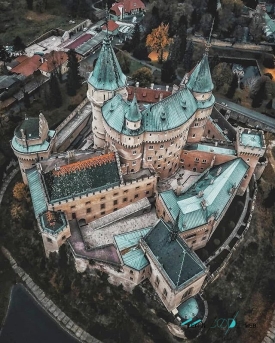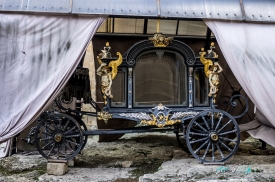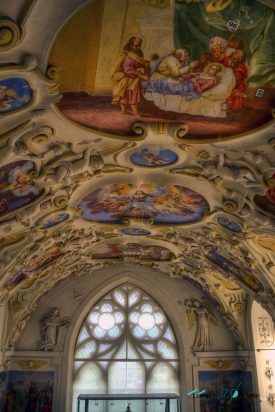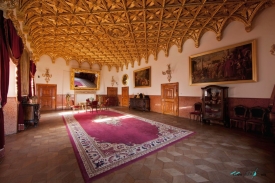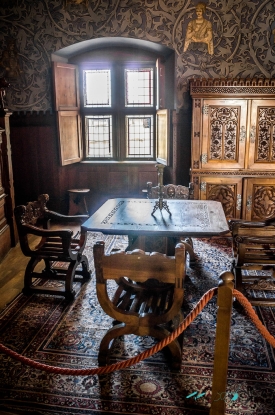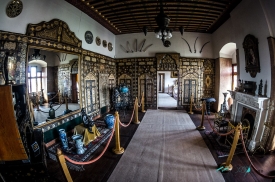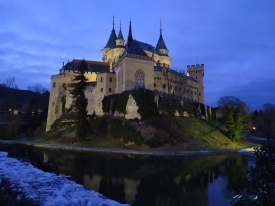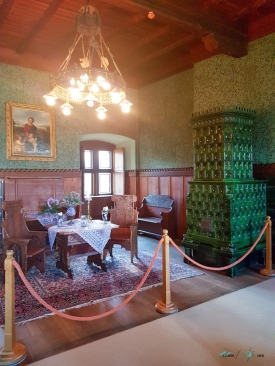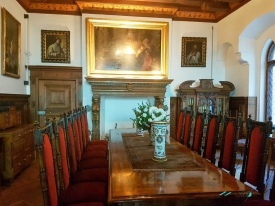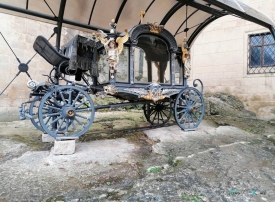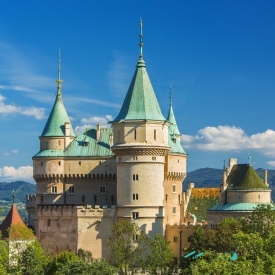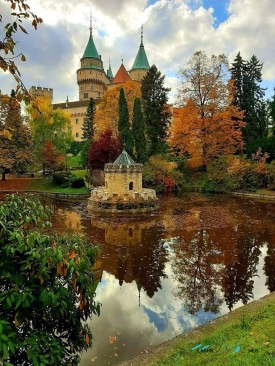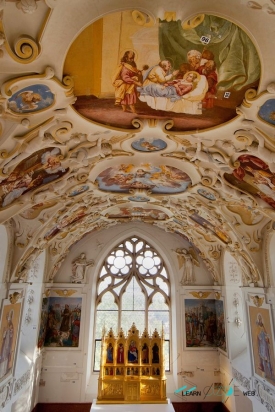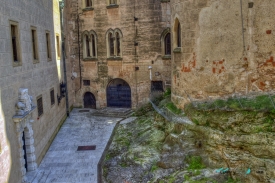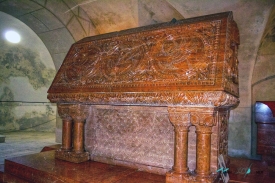Bojnice Castle (Bojnický Zámok in Slovak) is a medieval construction from the 13th century. The castle is surrounded by an artificial moat, on the right bank of the Nyitra River, on a small hill. It was an important element of the chain of castle-fortresses in Hungary in the Middle Ages, and later of the defense line - made up of 30 castles - that extended to Trencsén. The castle is surrounded by a stalactite cave with two lakes. According to tradition Mateo Csák planted the seven-century-old linden tree in front of the castle, 28 meters high and with a trunk diameter of 12 metres.
The castle, which is basically built in the Romanesque style, has Gothic and Renaissance elements from the 12th and 16th centuries. Bojnice Castle is first mentioned in written records in 1113, in a document kept in Zobor Abbey. It was originally built as a wooden fortress, which was gradually transformed into a stone building, the outer walls being designed in accordance with the uneven rocky terrain.
The first owner of the castle was Matthew Csák, ruler of all western and central Slovakia, who received the property from Wenceslaus III of Bohemia, and King of Hungary, in 1302. In the 15th century the castle was owned by the Hungarian king Matthias Corvino, at his death his illegitimate son, Juan Corvino inherited it in 1489.
The Thurzós, the wealthiest family in the northern Kingdom of Hungary, acquired the castle in 1528 and undertook its major reconstruction, turning the old fortress into a Renaissance castle. From 1646, the owners of the castle were the Pálffy family.
Between 1888 and 1909 Bojnice Castle underwent an extensive romantic reconstruction by Johann Pálffy. Who designed the current castle, which is modeled after the French castles of the Loire. Pálffy, architect and graphic designer, was one of the greatest collectors of ancient tapestries, drawings, paintings and sculptures of his time. After his death, his heirs sold the castle in 1939, along with the spa and surrounding land, to Jan Antonín Baťa, the owner of the Bata shoe factory. During World War II there was a Hlinka Guard leadership school at the castle.
After 1945, the Baťa estate was confiscated by Czechoslovakia and the castle became the seat of various state institutions. On May 9, 1950, a fire broke out in the castle that caused great damage. Since the state-mandated reconstruction, it houses a branch of the Slovak National Museum, which specializes in the documentation and presentation of historicism. In 1970 it was declared a National Monument of Culture.
The castle, which is basically built in the Romanesque style, has Gothic and Renaissance elements from the 12th and 16th centuries. Bojnice Castle is first mentioned in written records in 1113, in a document kept in Zobor Abbey. It was originally built as a wooden fortress, which was gradually transformed into a stone building, the outer walls being designed in accordance with the uneven rocky terrain.
The first owner of the castle was Matthew Csák, ruler of all western and central Slovakia, who received the property from Wenceslaus III of Bohemia, and King of Hungary, in 1302. In the 15th century the castle was owned by the Hungarian king Matthias Corvino, at his death his illegitimate son, Juan Corvino inherited it in 1489.
The Thurzós, the wealthiest family in the northern Kingdom of Hungary, acquired the castle in 1528 and undertook its major reconstruction, turning the old fortress into a Renaissance castle. From 1646, the owners of the castle were the Pálffy family.
Between 1888 and 1909 Bojnice Castle underwent an extensive romantic reconstruction by Johann Pálffy. Who designed the current castle, which is modeled after the French castles of the Loire. Pálffy, architect and graphic designer, was one of the greatest collectors of ancient tapestries, drawings, paintings and sculptures of his time. After his death, his heirs sold the castle in 1939, along with the spa and surrounding land, to Jan Antonín Baťa, the owner of the Bata shoe factory. During World War II there was a Hlinka Guard leadership school at the castle.
After 1945, the Baťa estate was confiscated by Czechoslovakia and the castle became the seat of various state institutions. On May 9, 1950, a fire broke out in the castle that caused great damage. Since the state-mandated reconstruction, it houses a branch of the Slovak National Museum, which specializes in the documentation and presentation of historicism. In 1970 it was declared a National Monument of Culture.



